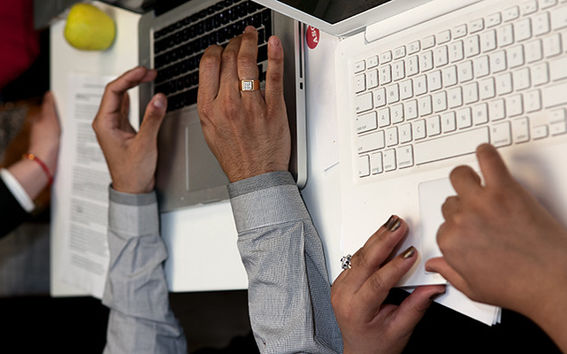Even diginatives need IT education

Bertta Sokura’s doctoral dissertation at the Aalto University School of Business offers new perspectives for enhancing users’ IT skills and shows how important it is to provide IT skills education.
‘Far too many have self-taught skills and use applications in their own, often inefficient ways. I demonstrated in my dissertation that an efficient learning process which enables deep learning is a prerequisite for adaptive IT use,’ Sokura says.
It is also necessary to teach how to use IT applications to diginatives, i.e. those who were born in the 1990s and later. Bertta Sokura is worried about the fact that no one is responsible for ensuring that young people acquire adequate skills to be able to utilise the most commonly used applications in companies and education institutions: work processing and spreadsheet.
Flow experiences enhance deep learning
An efficient learning process ensures that students will also be able to apply their IT skills in new situations. Motivation and flow experiences are key factors in this kind of learning process. Clear goals for the tasks, and skills and challenges in balance are prerequisites for the flow state. Furthermore, it is important to receive quick feedback. The individual can then find the task so inspiring and be so focused on the task that he or she loses all track of time. Furthermore, cognitive and experiential learning support this process. Cognitive learning emphasises students’ active involvement and independent processing of information. Experiential learning in turn integrates new knowledge into earlier experience.
Bertta Sokura gathered her research material between 2004 and 2012 mainly using longitudinal surveys. The material for the first sub-study has been gathered in connection with education designed for preparing students of business for a computer driving licence examination, and the material for the other three sub-studies in connection with teaching a course in information technology tailored for students of business.
Public examination of the thesis
Bertta Sokura, M.Sc. (Econ.), will defend her doctoral dissertation ”Learning to Use Office Applications: Understanding the Antecedents of Adaptive IT Use” in the field of Information Systems Science at the Aalto University School of Business on Friday, 1 April 2016 at 12 noon (Chydenia Building, Stora Enso Hall H-324). Professor Heikki Topi (Bentley University) will act as opponent and Professor Timo Saarinen from the Aalto University School of Business as custos.
More information:
Bertta Sokura
tel. +358 40 548 0313
bertta.sokura@aalto.fi
Read more news
Soil Laboratory Exhibition – Exploring the Dialogue Between Human and the Earth in Utsjoki
Soil Laboratory explores the relationship between humans and the earth as a living landscape through ceramic practices in Utsjoki.
The Finnish Cultural Foundation awarded grants for science and art
A total of 15 individuals or groups from Aalto University received grants
Environmental Structure of the Year 2025 Award goes to Kalasatama-Pasila tramway
The award is given in recognition of meritorious design and implementation of the built environment. Experts from Aalto University developed sustainability solutions for the project.






